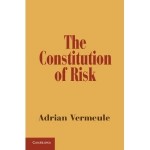 Adrian Vermeule’s new book, The Constitution of Risk, argues that much constitutional thinking follows a model of “precautionary constitutionalism,” where doctrines are designed to avoid worst-case outcomes. A better approach is what he calls “optimizing constitutionalism,” where such “political risks” are traded off rather than minimized. The Court of Appeals in Noel Canning, for example, appeared to be driven by a fear that if it upheld President Obama’s recess appointments, then presidents could tyrannize by avoiding the Senate altogether. It ignored the countervailing risk that if the recess appointment is limited, important offices would go unfilled. As Cass Sunstein has written in the area of regulation, the precautionary principle makes little sense on its own terms since there are always risks on all sides, and leads to pretty unattractive outcomes even when it can be applied. It’s as if we should all stay in our basements rather than take the risk that flower pot will fall on our heads if we go outside.
Adrian Vermeule’s new book, The Constitution of Risk, argues that much constitutional thinking follows a model of “precautionary constitutionalism,” where doctrines are designed to avoid worst-case outcomes. A better approach is what he calls “optimizing constitutionalism,” where such “political risks” are traded off rather than minimized. The Court of Appeals in Noel Canning, for example, appeared to be driven by a fear that if it upheld President Obama’s recess appointments, then presidents could tyrannize by avoiding the Senate altogether. It ignored the countervailing risk that if the recess appointment is limited, important offices would go unfilled. As Cass Sunstein has written in the area of regulation, the precautionary principle makes little sense on its own terms since there are always risks on all sides, and leads to pretty unattractive outcomes even when it can be applied. It’s as if we should all stay in our basements rather than take the risk that flower pot will fall on our heads if we go outside.
Among the many excellent insights, the one I found most striking was the claim that much traditional constitutional thinking and doctrine has a precautionary-principle cast to it, and is thus vulnerable to the same criticisms as that principle is.